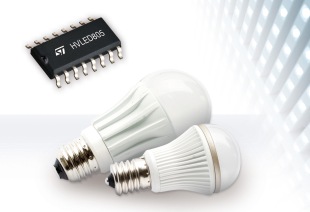Feb 28 2011
Producer of electronic lighting control ICs, STMicroelectronics has expanded its mains-operated LED lamp driver portfolio with the introduction of a Primary-Side Regulation (PSR) IC called the HVLED805.
PSR reduces the material costs for retrofit bulbs and thus minimizes their payback period. It also reduces the size of a LED control circuitry by simplifying its design.
 Primary-Side Regulation IC, HVLED805
Primary-Side Regulation IC, HVLED805
The new HVLED805 features an 800 V avalanche-rugged MOSFET that is attained by utilizing STMicroelectronics’ high-voltage incorporation method, which is higher than in other equipment and thus provides better durability. The on-chip startup circuitry enables the device to operate on the LED lamp whenever the AC line voltage is passed to the lamp.
PSR maintains the steady LED current within 5% accuracy that is required to assure constant light output and avoids the use of opto-coupler and current-sensing parts in traditional secondary-side regulation. This leads to reduction in size and cost of the LED driving circuitry, saves current-sensing losses and enhances the overall efficacy.
The HVLED805 incorporates high-voltage startup for effective and reliable power-on and the rugged 800 V power MOSFET reduces the snubber network. The ultra-effective quasi-resonant (QR) operating mode reduces energy consumption of LED lighting and thus significantly minimizes the use of the EMI filtering, which in turn saves both costs and space.